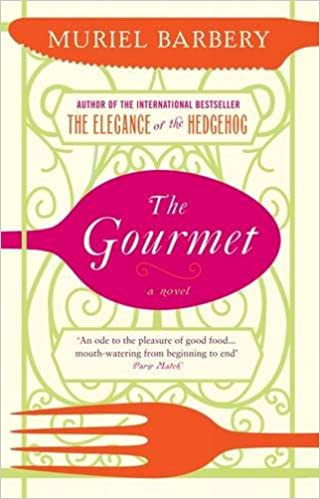This concise food drenched novel does what all good fiction does – explores truth, framed in inverted commas. And Gallic author Muriel Barbery has chosen a compelling narrative structure – a famous French food critic lies on his death bed trying to conjure up the one great taste memory that alludes him. The memory he recaptures in the final pages is at once fascinating, disappointing, delightful. And just in case you’re tempted to skip to the end, trust me, it won’t make any sense for the meaning is in the reading, just as the meaning of life is in the living. This is a noble little novel.
Translated from the French in 2009, the story explores the food critic’s final hours that takes him through his memories of the wonderful taste sensations he’d experienced – from his grandmother’s sensual cooking to his first taste of sashimi (“sashimi is velvet dust, verging on silk,” p. 52, Gallic Books, 2009 Paperback version) to simple fruit sorbet (“it evaporates down your throat and all it leaves on the tongue is the charming reminiscence of the fruit and water which once flowed there” p. 106). And interspersed between these food memories are first person recollections of a life lived through food – the critic’s adoring wife, the children that he detested and detest him back, his lover, his housekeeper that revels in his flatulence and others that touch his life and are touched by him, even the cat and a statue that adorns his room give their sometimes respectful and loving, or angry and vindictive views of the world famous food critic. The result is a book rich in paradox, taste and distaste.
The use of food as metaphor is all too popular in the arts today. But stories often become bogged down with flowery (or is it floury?) descriptions of exotic dishes, and the metaphor loses all meaning. Isn’t that what’s happening with our obsession with TV cooking competition programs – numerous renditions of Masterchef are all the same old story, told the same old way – human feats of excellence and brutal need for one-upmanship using cooking as a vehicle? Isn’t the screen version of the cooking competition basically a sports program?
So that’s why Barbery’s The Gourmet is so delightful. It is about a brutal yet brilliant man’s life of love, hate, beauty and disappointment. And it is this story that leaves you satisfied with the book in the end, not the food descriptions, evocative or cliched as they might be. And the protagonist may be a man, living in a world of high cuisine, but this book acknowledges what we know to be the most powerful of all culinary experiences – the home cooked meal.
“They knew well enough that, beyond all the humiliations they had suffered not in their own name but by virtue of their condition as women, that their men came home and sat down at the table, their own reign, as women, would begin. …They held their men not by the ties of domestic administration, or of children or respectability or even those of the bedroom, but by their taste buds, and this was as sure a thing as if they had put them into a cage into which the men had rushed of their own volition.” (p. 29)
by Masako Fukui, Copyright Kei’s Kitchen
The Gourmet by Muriel Barbery, originally published in English in 2009, Also published as Gourmet Rhapsody

